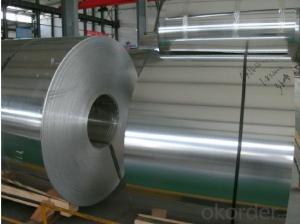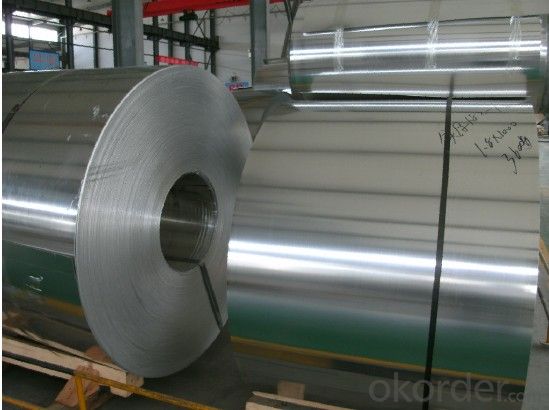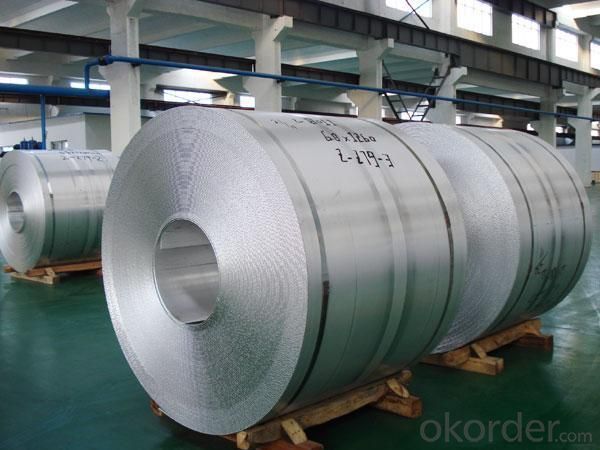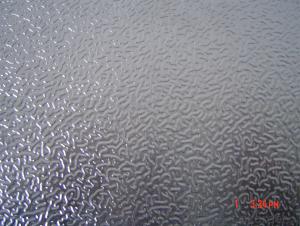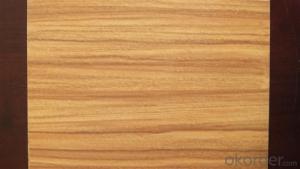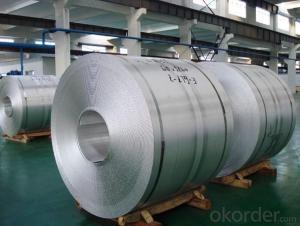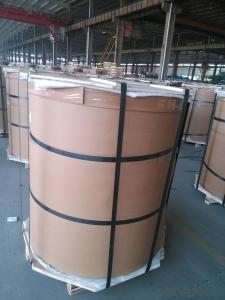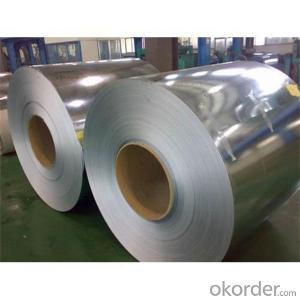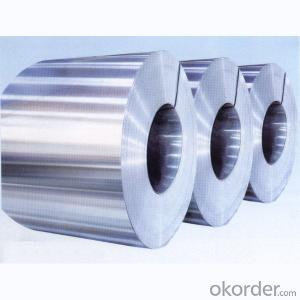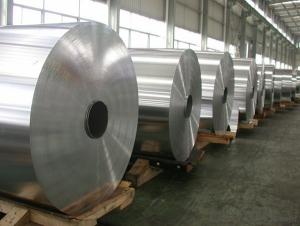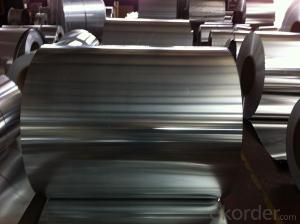Roll of Aluminum Coil - C.C AA1060 Aluminum Coils for Building Material
- Loading Port:
- Shanghai
- Payment Terms:
- TT OR LC
- Min Order Qty:
- 3 m.t.
- Supply Capability:
- 10000 m.t./month
OKorder Service Pledge
OKorder Financial Service
You Might Also Like
Specification
1.Structure of C.C AA1060 Aluminum Coils used as Building Material Description
C.C AA1060 Aluminum Coils used as Buiding Material widly used in decoration field. For the painting, it depends on the using evironment. If you use in the open air, we recommend the PVDF coated aluminium coils. This kind of painting can last 15-20 years. If you use in the room, we recommend PE coated aluminium coils. The price is much more competitive.
Direct Continuous Aluminium Foil Stock in Coil is one semi-finished aluminium material. This strip can be rolled down to aluminium foil.The final thickess can be 5-20 microns. Aluminium foil is soft, ductile and with a silver-white luster which can be widely used in a large scare of fields.
2.Main Features of C.C AA1060 Aluminum Coils used as Building Material
a.Competitive price---We have our own mills and can produce mill finished aluminium coils, so we can control the production cost better.
b.Professional after-sale service---We have more than 15 years exportation experience and you need not worry about the exporation problems.
c.Fast delivery time---We can control the delivery time within 35 days.
3.C.C AA1060 Aluminum Coils used as Building Material Images
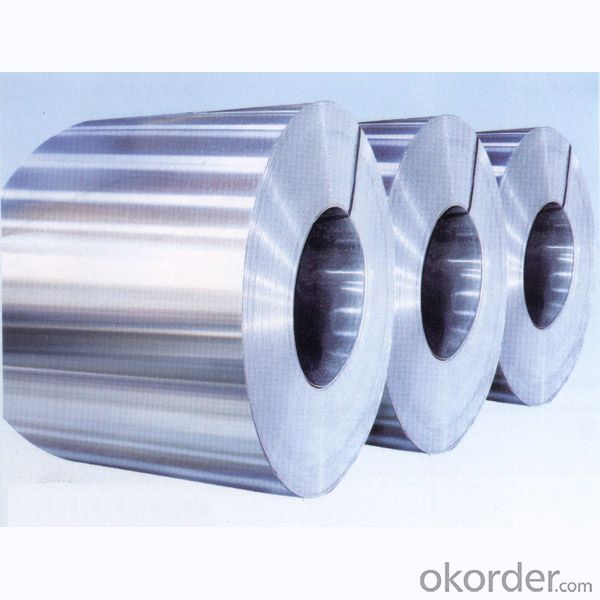
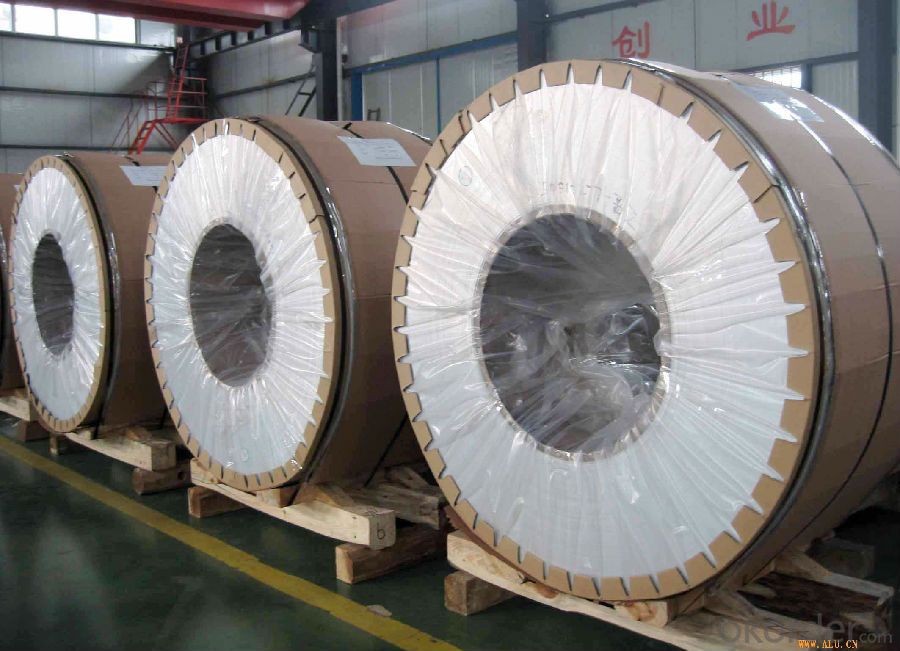
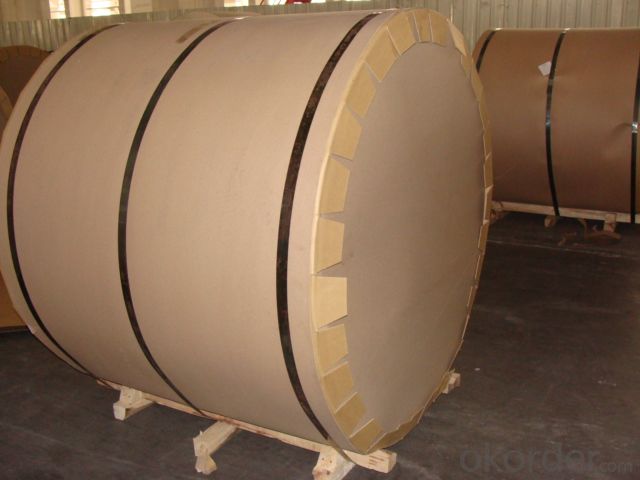
4.C.C AA1060 Aluminum Coils used as Building Material Specification
Alloy | AA1060 |
Temper | H14, H16, H18, H22, H24, H26, H32, O/F |
Thickness | 0.2mm -- 100mm |
Width | 30mm -- 1700mm |
Standard | GB/T 3880-2006,EN |
5. FAQ of C.C AA1060 Aluminum Coils used as Building Material
A.How to guarantee the quality?
Customers are welcome to our mill to visit and check the products. Besides, we can arrange a third party to test C.C AA1060 Aluminum Coils used as BUiding Material.
B.When will you deliver the products?
C.C AA1060 Aluminum Coils used as BUiding Material will be delivered within 35 days after receiving advanced payment or original L/C.
- Q: Can aluminum coils be used in the construction industry?
- Yes, aluminum coils can be used in the construction industry. Aluminum is a versatile and lightweight material that offers several advantages for construction applications. Aluminum coils are commonly used in the construction industry for various purposes, such as roofing, siding, gutters, and fascia. One of the main benefits of using aluminum coils in construction is its corrosion resistance. Aluminum naturally forms a protective oxide layer on its surface, which prevents rust and corrosion. This makes it highly suitable for exterior applications, where exposure to moisture and weather elements is common. Additionally, aluminum coils are easy to shape and work with, making them ideal for creating custom components and structures. They can be easily cut, bent, and formed into different shapes, allowing for flexibility and creativity in construction projects. Another advantage of aluminum coils is their lightweight nature. Aluminum is significantly lighter than other metals like steel, making it easier to handle and transport. This can reduce construction costs and make installation processes more efficient. Furthermore, aluminum is a sustainable and environmentally-friendly material. It is 100% recyclable and can be reprocessed repeatedly without losing its properties. This makes aluminum coils an eco-friendly choice for construction projects. In conclusion, aluminum coils are widely used in the construction industry due to their corrosion resistance, flexibility, lightweight nature, and sustainability. They offer numerous advantages for various applications and contribute to the overall efficiency and durability of construction projects.
- Q: I'm wondering if there is a resin/molding material that can withstand the heat of melted aluminum for casting parts. I know that sand casting is the 'norm' but is there anything else? I'd rather not have to pack sand every time I want to cast a part.Thanks!
- One common mold material for metal casting is plaster mixed with silica sand to give it more strength. It needs to be completely (like heated) dry before you use it, but it is actually more work than sand casting but it gives a better finish. There are some rubber materials which can withstand the heat of casting pewter, but the melting point of pewter is so much lower than aluminum that I am sure those won't work for aluminum. I think you are pretty much stuck with sand for the easiest method.
- Q: What is the formula to calculate the wall thickness of aluminum coil?
- Aluminum coil thickness*aluminum coil width*aluminum coil curl*aluminum density (the density of aluminum alloy: 2.73, the density of pure aluminum: 2.71)
- Q: Can aluminum coils be used in marine or saltwater environments?
- Indeed, marine or saltwater environments allow for the utilization of aluminum coils. The exceptional corrosion resistance of aluminum renders it a fitting material for a multitude of marine applications. The naturally occurring oxide layer on the exterior of aluminum acts as a shield against saltwater and other corrosive substances. This layer can be further fortified via procedures such as anodizing or painting, thereby augmenting its ability to resist corrosion. Furthermore, the lightweight nature of aluminum coils confers an advantage in marine applications where the reduction of weight is sought after. On the whole, the corrosion resistance and lightweight characteristics of aluminum coils render them a favored option in marine and saltwater environments.
- Q: How do aluminum coils contribute to the durability of roofs and facades?
- The durability of roofs and facades is greatly enhanced by aluminum coils, thanks to their inherent properties and design characteristics. Firstly, aluminum's resistance to corrosion makes it an ideal material for roofs and facades that are constantly exposed to harsh weather conditions. This corrosion resistance ensures that the coils remain unaffected by moisture, UV rays, and extreme temperatures, thus extending the lifespan of the entire roofing or facade system. Moreover, aluminum coils provide structural integrity to roofs and facades while being lightweight. This lightweight nature simplifies the installation process and reduces the load on the building's structure, which is particularly advantageous for larger structures. Despite their lightness, aluminum coils have high tensile strength, enabling them to withstand significant loads and pressure without warping or deforming. This strength enhances the overall stability and durability of the roof or facade, ensuring resistance against external forces like wind, snow, and hail. Furthermore, aluminum coils are highly malleable, allowing for easy customization during the manufacturing process. This flexibility enables the coils to be shaped and formed to fit various architectural designs, resulting in a seamless and aesthetically pleasing appearance. The ability to customize the coils also facilitates efficient installation, as they can be tailored to fit different dimensions, angles, and contours of roofs or facades. Additionally, aluminum is a non-combustible material, which makes it an excellent choice for roofs and facades in terms of fire safety. The non-combustible nature of aluminum coils greatly reduces the risk of fire spreading, providing an extra layer of protection to both the building and its occupants. In conclusion, aluminum coils significantly contribute to the durability of roofs and facades by offering corrosion resistance, lightweight yet high tensile strength, malleability for customization, and non-combustibility. These properties ensure that the roof or facade can withstand the test of time, harsh weather conditions, and external forces, making aluminum coils a reliable and long-lasting choice for any building structure.
- Q: Are there any environmental considerations when using aluminum coils?
- Yes, there are several environmental considerations when using aluminum coils. Firstly, the production of aluminum involves extracting bauxite ore, a process that can result in habitat destruction and soil erosion. Additionally, the extraction and refining of bauxite requires a significant amount of energy, contributing to carbon emissions and climate change. Furthermore, the manufacturing process of aluminum coils involves various chemicals, such as lubricants, coolants, and solvents, which can have adverse effects on the environment if not properly managed. These chemicals can potentially contaminate water sources and harm ecosystems. Moreover, the disposal of aluminum coils at the end of their life cycle can be problematic. While aluminum is highly recyclable and can be melted down and reused, improper disposal can result in aluminum ending up in landfills where it takes hundreds of years to decompose. To mitigate these environmental considerations, it is important to prioritize sustainable sourcing of aluminum, such as opting for recycled aluminum or using suppliers with responsible mining practices. Proper waste management and recycling of aluminum coils at the end of their life cycle are also crucial to reduce environmental impact. Additionally, improving energy efficiency throughout the production process and minimizing the use of harmful chemicals can help to mitigate the environmental footprint of aluminum coil usage.
- Q: Can aluminum coils be used in telecommunications infrastructure?
- Telecommunications infrastructure can employ aluminum coils as they possess several advantages. Firstly, aluminum, being a lightweight and durable material, finds extensive use in various industries, including telecommunications. Its cost-effectiveness, when compared to metals like copper, makes it a preferred choice for many companies in this sector. Moreover, the lighter weight of aluminum coils facilitates easier handling and installation, resulting in reduced labor and transportation costs. Additionally, aluminum's excellent electrical conductivity makes it suitable for transmitting data signals in telecommunications networks. By effectively carrying electrical current, aluminum coils ensure efficient data transmission without compromising quality. Consequently, reliable and high-speed communication over long distances becomes possible. Another advantage of incorporating aluminum coils in telecommunications infrastructure lies in their resistance to corrosion. When exposed to air, aluminum naturally forms a protective oxide layer, preventing rusting and corrosion. This resistance enhances the longevity and durability of the infrastructure, thereby reducing maintenance and replacement expenses over time. Nevertheless, it is crucial to acknowledge that aluminum possesses lower tensile strength than copper. Therefore, the infrastructure's structural integrity must be adequately considered and engineered when employing aluminum coils. Additionally, specific connectors and compatible hardware may be necessary. In conclusion, the use of aluminum coils in telecommunications infrastructure is highly effective due to their cost-effectiveness, lightweight nature, electrical conductivity, and corrosion resistance. Proper planning and design are imperative to ensure the successful implementation of aluminum coils in telecommunications networks.
- Q: I have been reading up on thermite and the required ingredients. I have extremely fine aluminum powder from a small etch-a-sketch sitting on plastic wrap in my room. On the comments page of the site i got the thermite ingredients from, multiple people said that thermite could explose if you use too fine of a powder. I have also read that powdered aluminum can become very explosive when it is exposed to air or if it becomes damp. Ive gotten particulary worried because the humidity right now is 93%. So, is powdered aluminum too dangerous to have in house and is too fine powdered aluminum explosive when in thermite?
- Fine sugar in the form of dust is also explosive as well as fine flour I think.
- Q: Can aluminum coils be used in automotive applications?
- Yes, aluminum coils can be used in automotive applications. Aluminum coils are lightweight, which makes them an excellent choice for automotive manufacturers as it helps to reduce the overall weight of the vehicle. This, in turn, can improve fuel efficiency and performance. Additionally, aluminum coils have excellent heat conductivity, which is crucial in automotive applications where heat dissipation is important. Moreover, aluminum coils have good corrosion resistance, which is particularly beneficial in automotive applications where vehicles are exposed to various weather conditions and road salts. Overall, the use of aluminum coils in automotive applications can provide several advantages such as weight reduction, improved fuel efficiency, better heat dissipation, and enhanced corrosion resistance.
- Q: Are aluminum coils resistant to moisture?
- Indeed, moisture poses no threat to aluminum coils. Being inherently resistant to corrosion, aluminum possesses an innate capability to combat the detrimental effects of moisture and other environmental elements. Consequently, it becomes an exceptional option for endeavors where moisture resistance holds paramount importance, including HVAC systems, refrigeration units, and outdoor equipment. Furthermore, aluminum can be fortified with an assortment of protective coatings and treatments to augment its moisture resistance and prolong its lifespan. In summary, the durability and moisture-withstanding capacity of aluminum coils render them a dependable choice across diverse industries.
Send your message to us
Roll of Aluminum Coil - C.C AA1060 Aluminum Coils for Building Material
- Loading Port:
- Shanghai
- Payment Terms:
- TT OR LC
- Min Order Qty:
- 3 m.t.
- Supply Capability:
- 10000 m.t./month
OKorder Service Pledge
OKorder Financial Service
Similar products
Hot products
Hot Searches
Related keywords
